Table of contents
Letter from the Board
Dear Modelica, FMI, SSP, DCP, eFMI interested,
The International Modelica Conference 2023 took place on Mo. Oct. 9 - Wed. Oct. 11, 2023, in Aachen, Germany, as a face-to-face conference. It was a pleasure to meet many of you in person again, exchange ideas and getting a lot of information. The local organizers from RWTH Aachen University provided a perfectly organized event in a nice, spacious conference center.
The scientific papers of the conference are available from the conference tool by scrolling down and clicking on a particular session.
The slides of the Modelica Association News session are available here providing information about the status of the Modelica Association projects, large research projects in the Modelica Association community and the Modelica Association Spreadshirt Shop.
Upcoming Modelica Conferences
- The American Modelica Conference 2024 will be held October 14-16 2024 in Storrs, Connecticut, organized by the North American Modelica Modelica Users Group NAMUG, The University of Connecticut and the Modelica Association.
- The Asian Modelica Conference 2024 will be held November 21-22 2024 in Seoul, South Korea, and is organized by the Institute of Vehicle Engineering, iVH and the Modelica Association.
- The Modelica Association Board is currently reviewing applications for the International Modelica Conference 2025
If you have interesting news for the Modelica, FMI, SSP, DCP, eFMI communities, please
follow the submission guidelines.
The deadline for articles for the next newsletter is Friday, February 9, 2024.
Martin Otter on November 13, 2023
Chairperson of the Modelica Association
This article is provided by Martin Otter (Modelica Association)
Modelica Association
FMI news
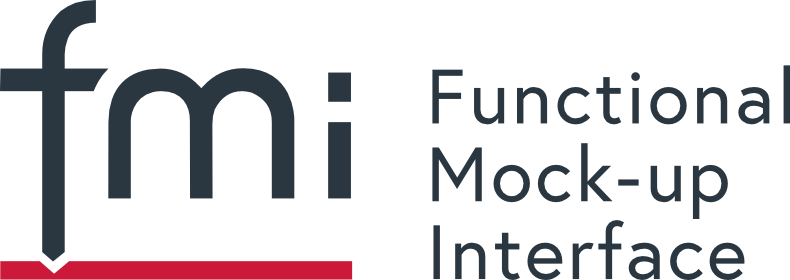
FMI at the Modelica Conference
It was great to meet the FMI users and developers again in person at the Modelica Conference in Aachen! The papers are avaialable as preprints in the conference session overview.
FMI Beginners’ Tutorial available
Watch the recording of the “FMI Beginners’ tutorial” from the Modelica Conference 2023 in Aachen on YouTube, material available here. Thanks to Cinzia Bernardeschi, Christian Bertsch, Cláudio Gomes, Maurizio Palmieri, Torsten Sommer for jointly preparing and holding this tutorial!
FMI Compatibility Information provided in the FMI Tools List
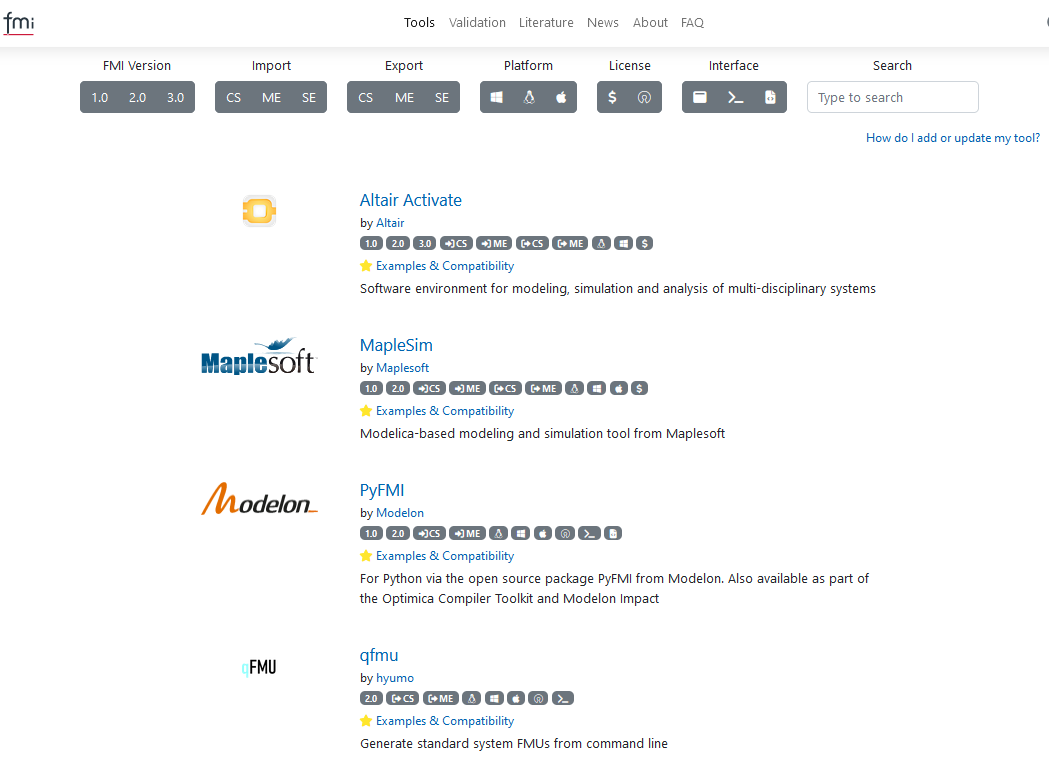
The FMI tools page now lists 192 tools supporting tools!
The tools listed on top and marked with the golden star now provide “compatibility information”: They document how the tool vendors have tested their FMU import and export capabilities and standard compliance with other tools. Exporting tools also provide example FMUs, that can be tested by other importing tools. This information is provided on an external webpage or repository in the responsibility of the tool vendors.
FMI Design Meeting in Nov 2023 in Sindelfingen, Stuttgart
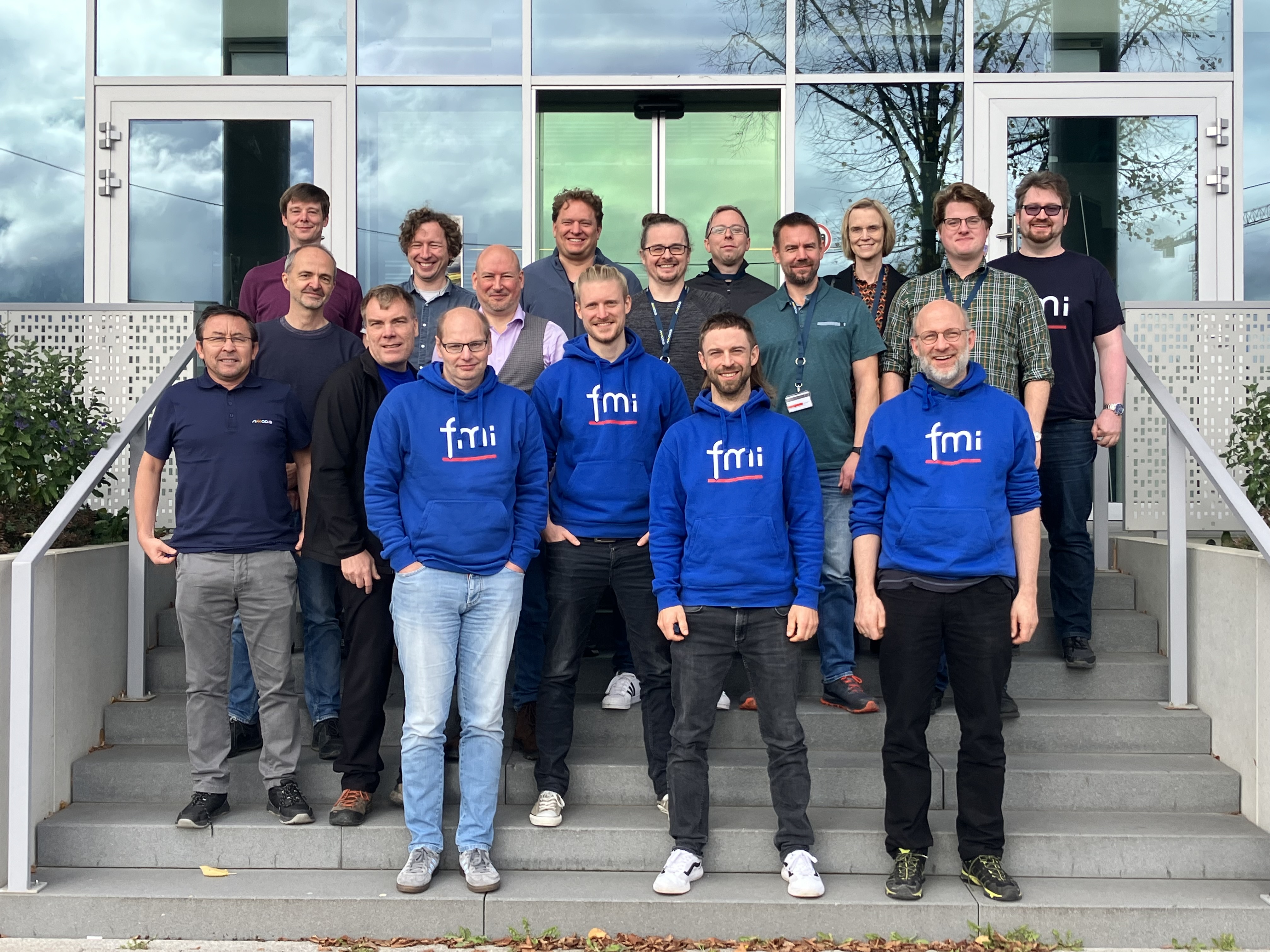
FMI developers from Akkodis, AVL, Bosch, Dassault Systemes, dSPACE, EKS-INTEC, ESI, ETAS, PMSF, Synopsys, and Wolfram MathCore participated. Thanks to Akkodis for the great hospitality!
We focused on layered standards to FMI 3.0
- FMI-LS-XCP for XCP support (v1.0RC2 in preparation)
- FMI-LS-BUS for network communication (v1.0alpha in preparation)
- FMI-LS-STRUCT for maps and structuring of variables (concept work)
- and new ideas for layered standards reference source models, reference solutions, parameters sets
Additionally we discussed possible efficiency optimizations for data transfer and access that can be addressed in FMI 3.1 (see also next paragraph).
Call for Problems
Currently the FMI project starts working on FMI 3.1 and would like the to ask the FMI user community to report their current pain points and ideas for future development. We currrently have the idea to work on efficiency: we have identified that for FMUs that handle a large amount of data communication compared to internal calculations, the current desig of FMI leads to overhead due to copy operation of data. This could be either due to a very large amount of scalar variables, or large data amounts in form of array or binary variables. Several solution approaches are in discussion, but currently the problem itself his not yet fully clear and has not yet been described in detail. So, if you face efficiency problems in the simulation of FMUs that can be traced back to communication overheaed, please report them to us in form of use case descrption and problem statement.
More generally, if you have problems w.r.t. model exchange and co-simulation that cannot yet be solved well with FMI 3.0, please describe and send them either in the form of an Github issue or via e-mail to contact@fmi-standard.org.
Other Resources and Discussion Forums for FMI related Questions
- Join the LinkedIn FMI community to get the latsted news on FMI, FMI supporting tools and discussions within the user community.
- Follow the Modelica Association on LinkedIn to keep up to date w.r.t. the Modelica language and libraries, and the #FMI, #SSP, #DCP and #eFMI standards.
- Ask technical questions and discuss topics on the usage of FMI on Stackoverflow tagged “FMI”.
- Report problems of the standard itself or suggestions for new features in form of issues on on fmi-standard.org.
This article is provided by MAP FMI
Vendor news
orchideo | easySSP v1.2.8 now available
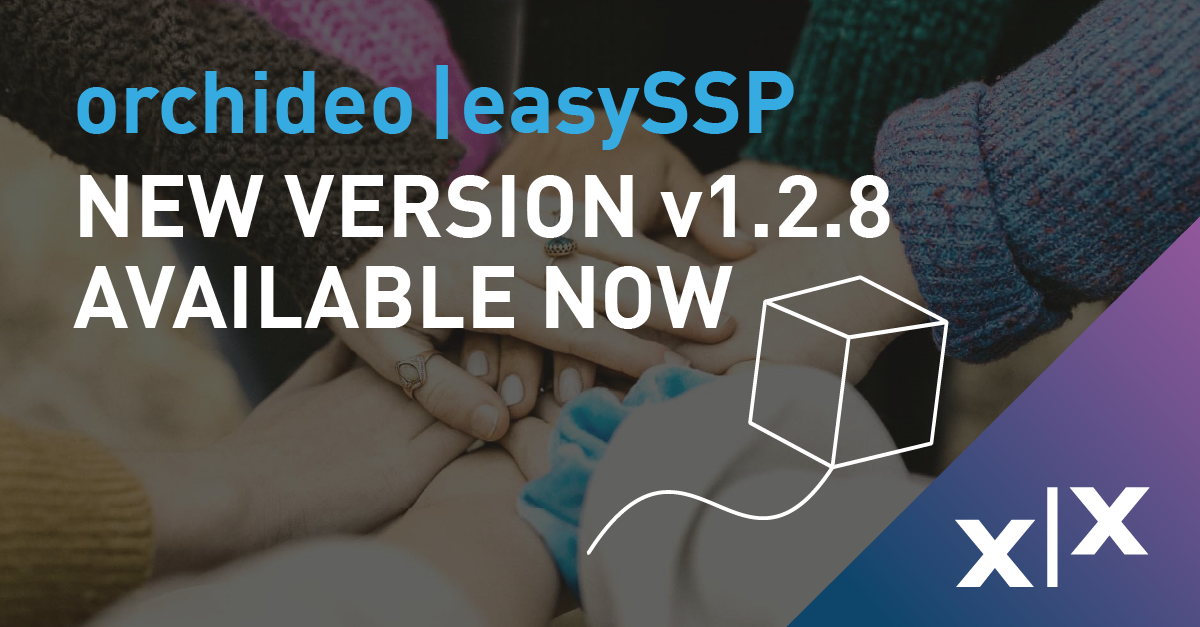 orchideo | easySSP v1.2.8 is now available with a new documentation area, new integration options and extended support for Simulation Resource Metadata (SRMD).
orchideo | easySSP v1.2.8 is now available with a new documentation area, new integration options and extended support for Simulation Resource Metadata (SRMD).
New Documentation
easySSP now includes a new Documentation area, where you can find help and information to get started with easySSP.
Integration API
easySSP’s Import/Export API allows to seamlessly integrate easySSP’s editor and simulation capabilities into existing tools and processes.
Additional, a new Simulation API lets you simulate SSP files with integrated FMI components in the easySSP Cloud, such as different model variants, parameterizations, input stimuli and targets (Windows/Linux 32/64). All these aspects can be freely combined and the simulations started can be conveniently managed in a dedicated UI.
You can find more information about the easySSP Integration API in our public API Documentation.
Extended SRMD and MIC Core Support
easySSP now offers an greatly improved SRMD editor with template and validation support for the new MIC Core Standard for efficient exchange of simulation model metadata published by IRT SystemX and prostep ivip.
Furthermore the new release includes many smaller new features and usability improvements such as:
- SSP compliant System Structure Description (SSD) file import and export
- Support for placeholder resources in the SSP Traceability process documentation
easySSP is completely based on open standards like FMI, SSP and SSP Traceability. Check out easy-ssp.com for more information!
This article is provided by Gregor Hermann, Peter Lobner eXXcellent solutions
XRG Product News and Contributions to the International Modelica Conference 2023
Our Product NEWS
XRG HumanComfort and FluidDynamics Library
XRG offers two unique Modelica libraries that enable Navier-Stokes-based CFD coarse grid simulations in Dymola and Modelica. Profit from seamless coupling with system models and less computational effort for transient simulations.
Pre-processing and post-processing is provided by our Score lite Application which is a complementary feature of HumanComfort and FluidDynamics Library. If you already hold licenses of one or both libraries and do not have Score yet: Get in touch with us and request your free license of Score lite today.

XRG HVAC Library
The newest version 3.0.0 of our HVAC Library, offering the fastest HVAC simulations on the market, is now available for
- Dymola (Dassault Systèmes)
- OpenModelica
- Impact (Modelon)
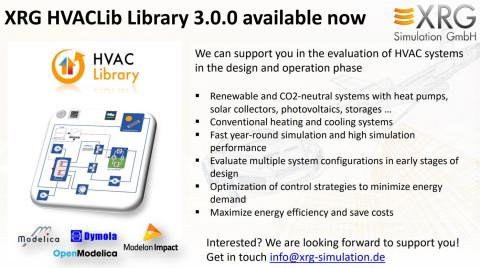
The HVAC Library includes components to model conventional energy systems with gas or oil boilers, as well as sustainable, CO2-neutral systems with heat pumps, solar thermal collectors, photovoltaics and storage units. By using a pressure-free modelling approach, simulation results can be delivered very fast, even for complex systems. This makes the models ideal for annual simulations and automated optimization techniques.
The new version 3.1.0 of the HVAC Library got a comprehensive update and improvement of many component models which will be presented in the XRG vendor session on Mon., 9th (see above).
XRG Score Application
XRG Score executes parallel Dymola or FMU simulations, imports large Dymola or OpenModelica result files and lets you filter and interpolate them. Our Score Application allows you to define and save all your simulation settings, model parameters and any results you require in a workbook and directly share them with others. You can run, import and report on any number of simulations over one of these workbooks. You can automatically transfer the results in Excel spreadsheet templates along with integrated charts and formulas.
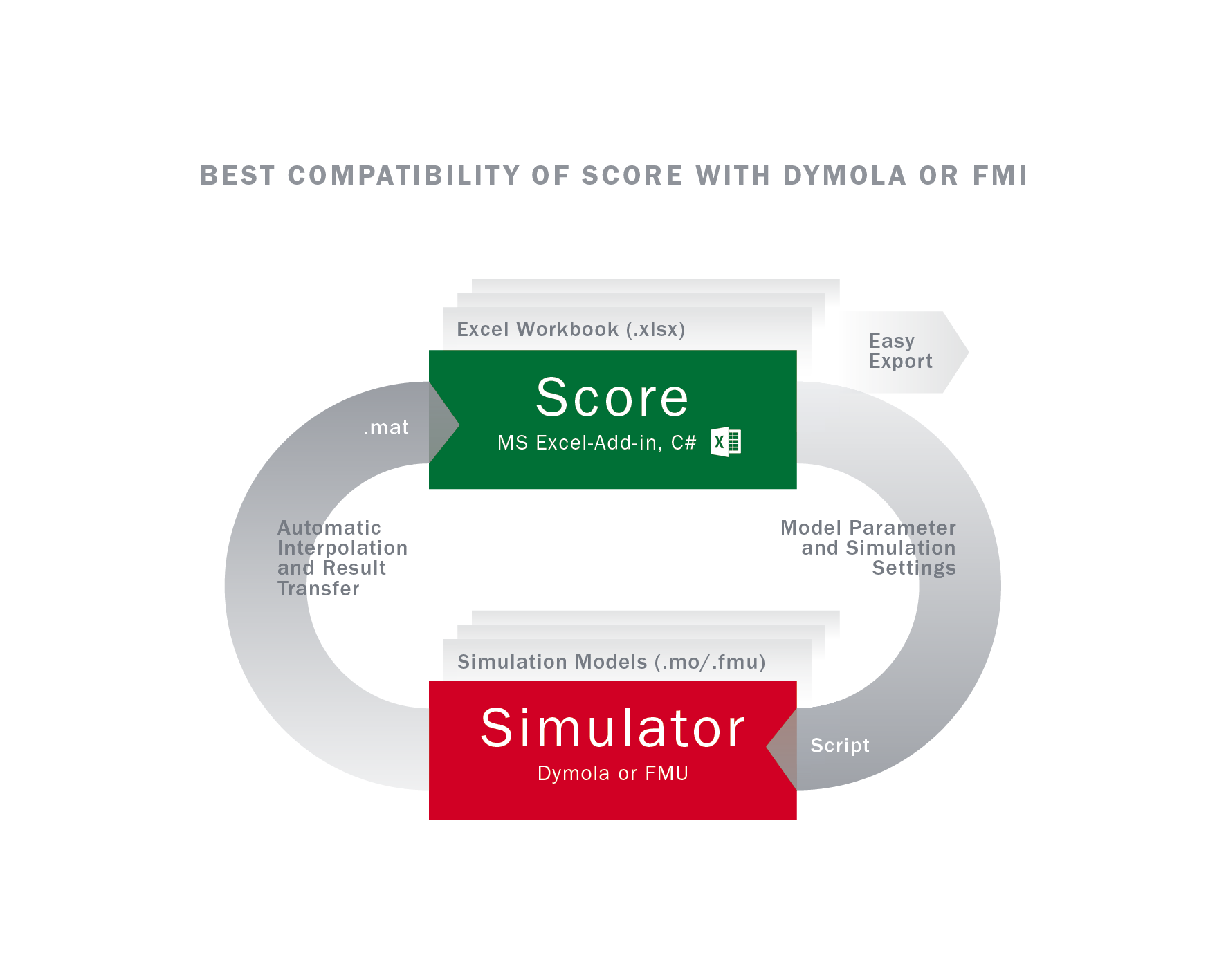
More technical features of Score:
- Multi-Threading (parameter sweeps on multiple CPU cores) of Dymola or FMU simulations
- Automatized simulation process
- Import, filtering and interpolation of complex result files (Dymola, FMU and OM) in Excel
- Easy exchange of Excel workbooks
- Template reports
- Broad support of MS Office versions through COM add-in
The new version 1.9 incorporates some interesting features about post-processing of HumanComfort and FluidDynamics CFD results and more. Please attend the XRG vendor session on Mon., 9th (see above).
ClaRaPlus Library
Well established ClaRaPlus Modelica library provides its users with the capability to proficiently tackle tasks in the disciplines of thermal hydraulics, instrumentation and control pertaining to power plants and other kind of energy systems. Based on the needs of steadily growing community of ClaRaPlus users community, it has broadened its scope over the years of its development, transcending the original focus on conventional power plants to encompass renewable power plants, waste heat utilization, general process plants, refrigeration cycles, heat pumps and beyond.
The recent version 1.7.1 of ClaRaPlus brings an exciting addition to the already impressive suite of features - support for the utilization of various artificial intelligence models in Modelica simulation tools.
Some of the key features are:
- Detailed models of turbo machinery, 4Q pump/compressor, piping, valves, heat exchangers, furnace, fluidized bed, drum, coal mill
- Demonstrators for Coal/Combined/ORC power plant
- DCS package – ready-to-use state of the art control blocks and controller examples
- Grid package – enables investigations of interactions with the electrical grid
- Flexible and user-friendly with efficient means for simplified steady state analysis (via StaticCycles models) for the calculation of consistent initial values for states to smooth the initialisation of complex thermodynamic cycles
- Well defined model design principles including level of detail, level of insight, naming conventions, limited inheritance depth, comprehensive documentation, and more
- Extensive Media Library – including ORC Media and steel data base
- Support for AI (see SMARTIInt Library)
- Validated against literature and measurement data
XRG’s open-source products
We have moved all our current open-source products to Github. You are welcome to start collaborating today!
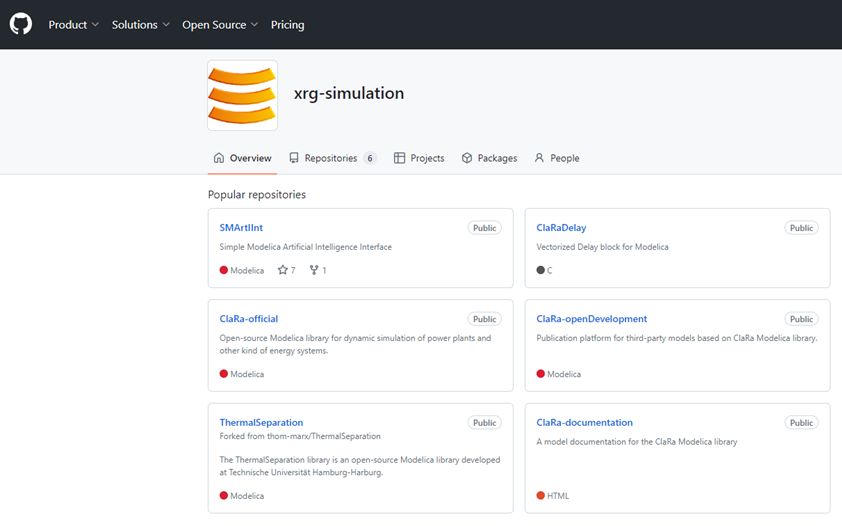
SMARTIInt
SMARTIInt provides a user-friendly interface between Modelica and data-based AI models. With its first release the SMARTIInt Modelica library provides integration of TensorFlow neural networks (feed forward and recurrent) as Modelica functions. SMARTIInt can be found on Github.
We intend to support further data formats and network structures in the future. Community feedback and help are highly welcome!
ClaRaDelay
Unlike the Modelica delay operator, ClaRaDelay also supports vectorized delay time inputs. This is especially useful when it comes to convolution integrals or other control applications. See Github for details.
ClaRa Library goes GITHUB
The open-source library ClaRa enables detailed analysis of power plant processes in Modelica and now broadens its scope towards renewable energies. Its official releases are now also available from Github. With the newly established ClaRa Open Development Repository we encourage the community not only to give feedback but also to participate in ClaRa’s development by contributing models. Don’t miss our presentation “Status of the ClaRa Library: Detailed Transient Simulation of Complex Energy Systems”(Link to session) at the 15th Modelica conference!
This article is provided by Stefan Wischhusen XRG Simulation GmbH
Simcenter Amesim 2310 released
Siemens Digital Industries Software is pleased to announce that Simcenter Amesim 2310 has been released on October 27, 2023, as part of its system simulation solutions. This release brings noticeable improvements to exported FMUs, for an easier deployability of system simulation models in a wide variety of simulation contexts. It also strenghtens the interoperability of Simcenter Amesim models with artificial intelligence (AI) frameworks.
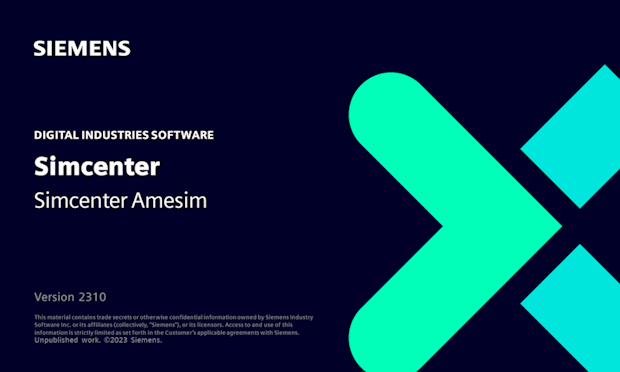

Improved capabilities of exported FMUs
With Simcenter Amesim 2310, the capabilities of exported FMUs have been improved, which is especially useful for Hardware-in-the-Loop (HiL) but also for the overall robustness of FMI based simulations and workflows.
- A deployed FMU model can now be reinitialized during the simulation (“hot reinit”), optionally with new parameter values applied, without having to unload it. This allows calibration engineers to chain maneuvers or scenarios easily within their test sequencing software and/or on their real-time systems (e.g. successfully tested on dSPACE SCALEXIO with 2.0 and 3.0 FMUs).
- More meaningful constant values can now be defined as default inputs of models intended to be exported as FMUs, which greatly improves the usability of open-loop simulations (for validating models before export), and the robustness of FMU initializations later on, when performed by non-expert users. As these more meaningful start values get automatically stored in exported FMUs, enabling their silent reuse, “lazy” FMI importing tools can indeed start simulations with a much higher degree of confidence.
- Exported 3.0 FMUs can now optionally provide the adjoint derivatives, in addition to the directional derivatives, which is typically needed for backpropagation in gradient-based training of artificial intelligence (AI) models. Users can thus encapsulate and train AI models more efficiently with Simcenter Amesim 3.0 FMUs, thus connecting the system simulation world to the Python/Julia tool world more easily. It also becomes possible to combine physics-based and AI-based models (e.g. neural ODEs) and training in a unified framework.
Easier reduction and/or hybridization of physical models with AI
In addition to the improved capabilities of exported FMUs, Simcenter Amesim 2310 tightens the links between the Open Neural Network Exchange (ONNX) and the Functional Mock-up Interface (FMI) standards. Thanks to the support of additional ONNX nodes that make sense for system simulation applications (35 nodes currently supported), the handling of pretrained neural networks is more robust for model reduction and/or hybridization purposes: users can either replace CPU time-consuming parts of their physical models by pretrained neural networks, or convert these Reduced Order Models (ROMs) directly as lightweight FMUs for reuse. They benefit from a higher compatibility with other recognized ONNX compatible software, such as Simcenter Reduced Order Modeling, Tensorflow, PyTorch or Julia.
More will come in future releases. Stay tuned!
For more information on Simcenter Amesim, please visit our website.
This article is provided by Bruno Loyer (Siemens Digital Industries Software)
OpenModelica 1.22.0 Released
Version 1.22.0 of OpenModelica was released on Nov 8 2023.
The main highlight of the new release is a significant improvement of the OMEdit GUI, made possible by the new instance-based architecture for the interaction between the OMEdit GUI and the underlying OMC compiler. Thanks to that, OMEdit can now handle parameter-dependent conditional connectors and parameter inputs, as well as replaceable components and classes with parameter editing for the redeclared object. Connection rendering was also improved, showing branching nodes in connection sets and improving the rendering of overlapping connections.
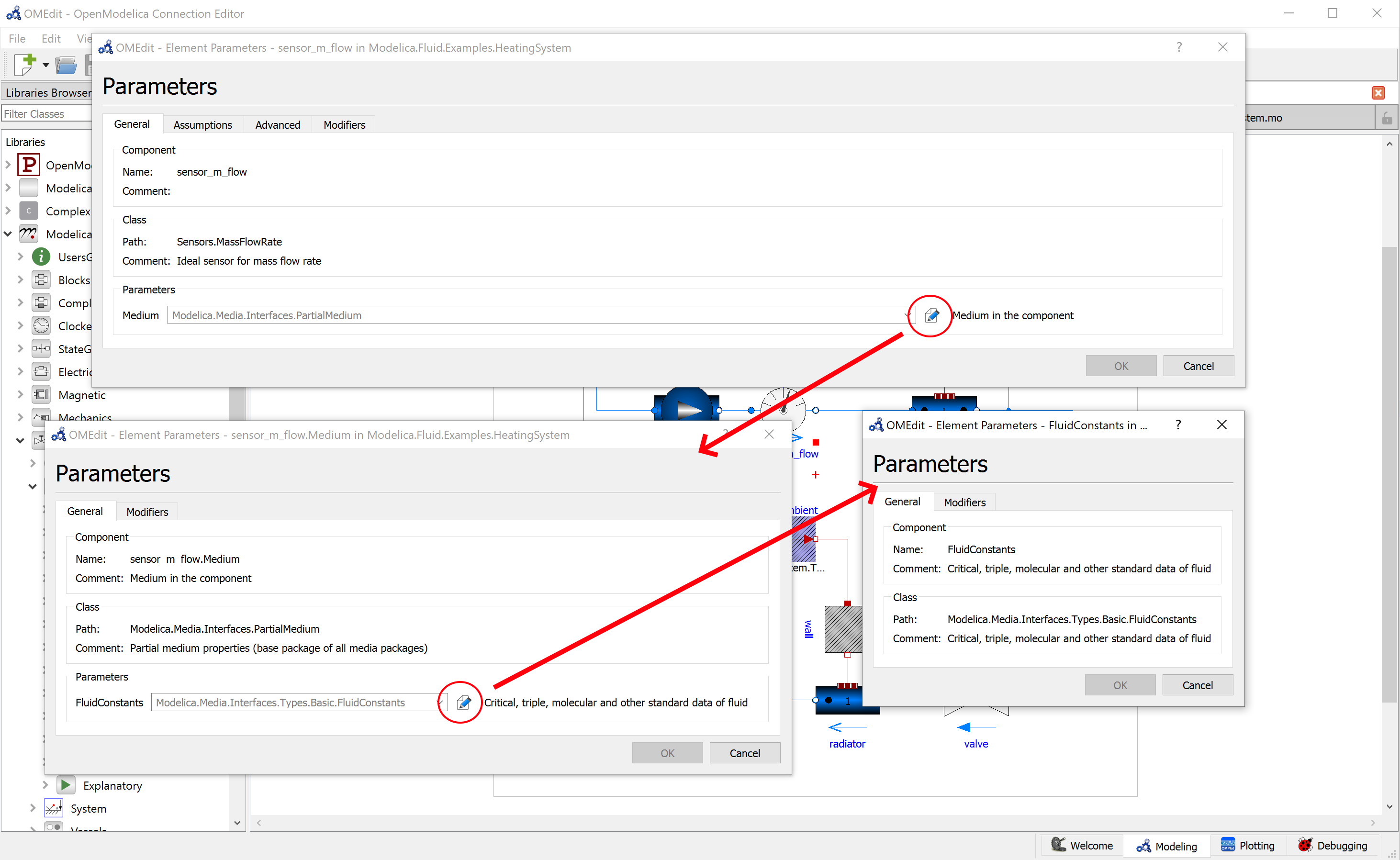
Several improvements were made to the C++ runtime:
- Support for ExternalMedia library (fix record inputs of external functions and bindings of records to scalar variables).
- Support for ThermofluidStream library (fix array dimensions of created temporary variables).
- Preliminary support for DAE mode.
- Fixed issue with start attributes for iteration variables of implicit nonlinear systems, which were previously lost.
The compiler frontend and backend has been further improved and many bugs were also fixed, leading to a much improved user experience, compared to the previous 1.21.0 release.
For further details, please check the release notes.
This article is provided by Adeel Asghar, Francesco Casella Open Source Modelica Consortium
Modelon News
Cogeneration Power Plants: Improving Operations in Complex Conditions
Designing and implementing cogeneration power plants is inherently complex. Not only do engineers need to consider varying load changes over time, but, also, the cost to keep up this technology. Modelon explores the promise of model-based systems engineering to design flexible and cost-efficient cogeneration power plants using Modelon Impact.
Modelon Impact for Heat Pump Design
Engineers and HVAC professionals face unique challenges when designing residential heat pumps that are environmentally friendly and cost-effective. Modelon’s cloud-based platform, Modelon Impact, comes equipped with the right components, example models, media models, and workflows within its Modelica-based libraries to help system engineers design and simulate state-of-the-art heat pumps. With Modelon Impact you can:
✅ Assess new refrigerants
✅ Size components and systems
✅ Predict efficiency variability
✅ Retrofit existing systems
✅ Optimize system design
✅ Evaluate operational flexibility
Watch the demo to see how Modelon Impact can help you design and improve residential heat pump systems: Modelon Impact Demo for the Design of Residential Heat Pump Systems
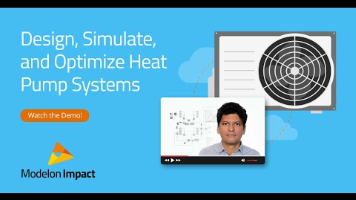
To get an understanding of the Modelica-based libraries and resources that Modelon Impact comes equipped with for residential heat pump design, download our application brochure
Modelon Innovate 2024
Modelon’s highly anticipated system simulation conference, Modelon Innovate, is back next year. Join us and other system modeling and simulation professionals around the globe in Copenhagen, Denmark to discuss the latest trends, success stories, and guides for getting the most out of Modelica-based system simulation technology. To be one of the first to find out when registration opens, sign up at (Innovate 2024)
This article is provided by Swati Tyagi (Modelon)
Dymola 2024x
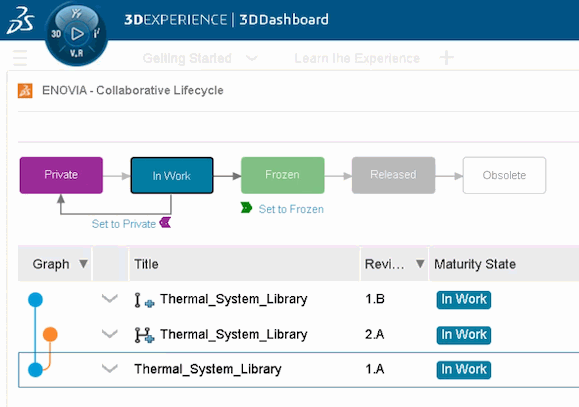
On 24 November 2023, Dymola 2024x becomes available for ordering and delivery.
Model editing
The Dymola standalone program has been connected to the 3DEXPERIENCE platform. Models can be version controlled in 3DEXPERIENCE, and the complete lifecycle is integrated with PLM tools. Furthermore, tools such as 2D/3D design and Project Planning are available and can launch Dymola.
Support for Git has been improved, including modification status visible in the Dymola package browser and a better model publishing dialog.
Simulation
Using a sparse solver for system of equations and a revised Jacobian approximation, faster simulation of many large systems is possible.
FMI 3 support includes early return when an event occurs, intermediate input and input interpolation. Variable step co-simulation make it possible to control the FMU step from the model.
Process Modeling Library
The library contains models to simulate thermal separa¬tion processes based on multi-phase multi-component equilibria. It allows you to predict the behavior of separation units, analyze heat and mass transfer processes, and to optimize operating conditions to maximize efficiency and minimize energy consumption. Using the Thermodynamics Connector library, complex media models available.
The library is used to troubleshooting complex systems, improve product quality, and reduce the environmental impact.
This article is provided by Dag Brück (Dymola webpage)
News from libraries
TLK TIL Suite - New version 3.15.0
The TIL Suite is a comprehensive Modelica library for stationary and transient simulations of thermodynamic systems. In November the TIL Suite 3.15.0 will be released and among others, the following new features are included:
- 4-way reversing valves for refrigerants are now available. The TIL example of a reversible air-to-water heat pump with periodic freezing and defrosting now uses a 4-way reversing valve.
- The provision of all function derivations in TIL and TILMedia for the use of the analytic Jacobian matrix in Modelica solvers has been improved, especially for TIL HD. This can increase computing speed.
We are also continually improving frosting models in the TIL Suite and provide well documented models, which can be simple and easy to parametrize or use more detailed approaches with flexible settings for ice formation.
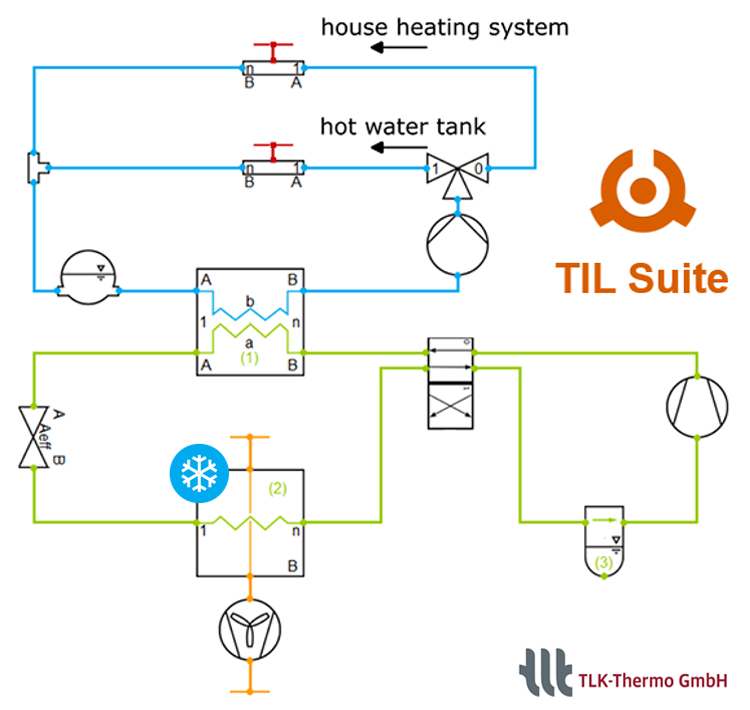
In addition to components and example systems already contained in TIL, many other add-on libraries are available. We provide add-ons for hydrogen energy systems, thermal storages like hot water tanks, and automotive applications, among others.
For further information about TIL Suite see www.tlk-thermo.com or contact us at til@tlk-thermo.com.
This article is provided by Ingo Frohböse TLK-Thermo GmbH
ProcessModelling library
The library is designed to model separation processes with backflow streams, evaporation, condensation and control. The library provides rectification columns, tanks, pipes, pumps, units or gravitational separation tanks. Develop an integrated digital twin for design, simulation, training, and operations. The Process Modelling and Engineering Library includes dynamic models for separation processes. The PME library uses the Multiflash® software by KBC to calculate phase equilibrium of multi-phase multi-component fluids. The Thermodynamics Connector library is used as an interface between the PME library and Multiflash®.
Many models of the Process Modelling and Engineering library come with animations in order to visualize key system parameters, for example liquid levels and temperature distributions in rectification columns, or the filling levels in a tank. Visualization during simulation and postprocessing allows for a quick overview about the current state of the simulated system.
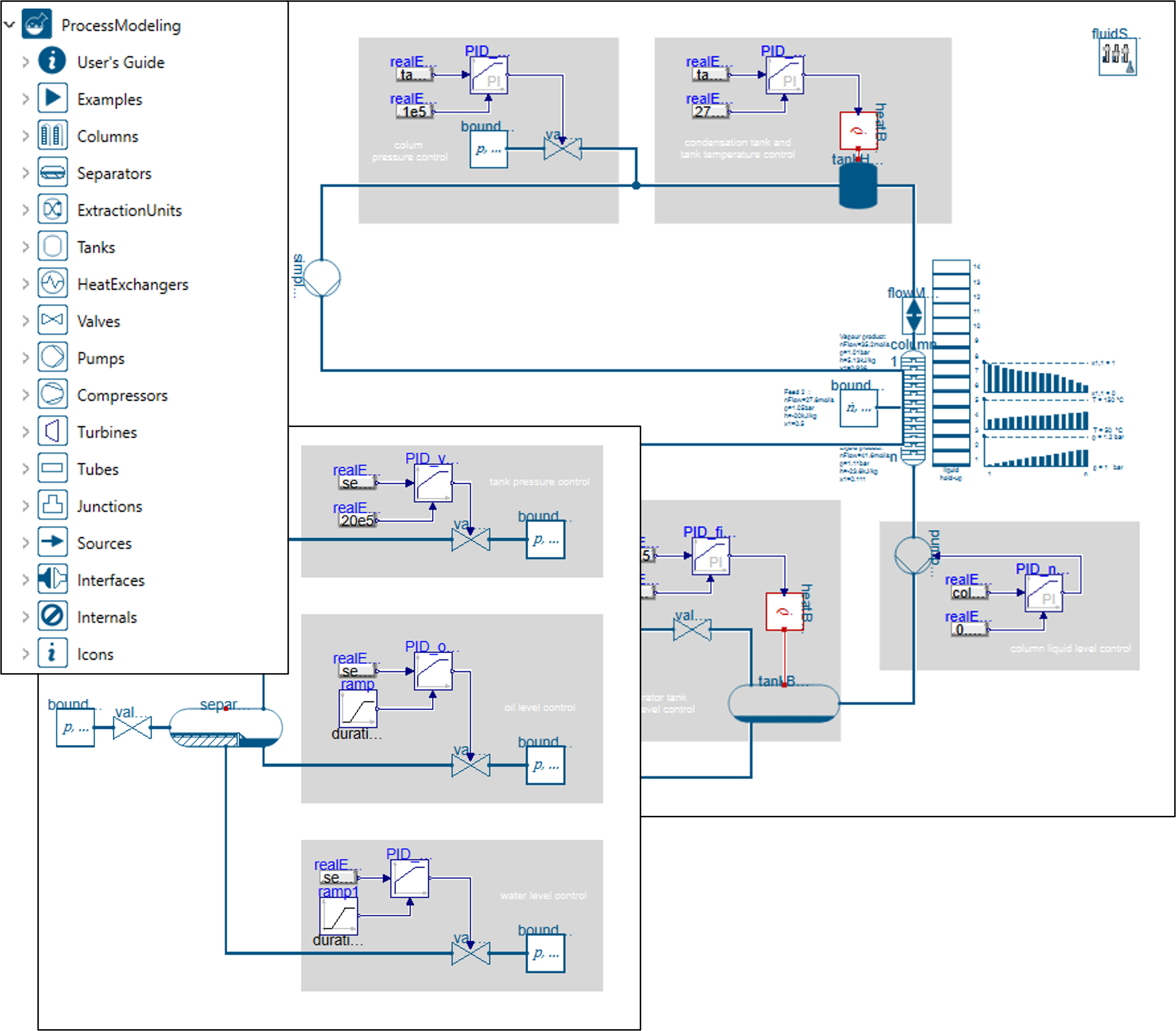
This article is provided by Maren Titze (Dassault Systemes Deutschland GmbH)
Upcoming - Free Rotating Machinery Library
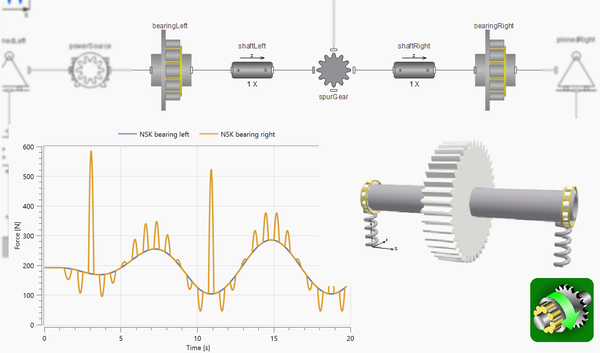
The Rotating Machinery library allows you to test novel designs or identify faults in rotating machineries such as turbines, motors and drivelines. Within the library, you’ll find fundamental components of a rotating machinery, such as gears, shafts and bearings. These components are designed to be flexible, enabling you to observe deformations and accurately capture real-world responses under different loads.
Rotating Machinery library will be released later this year. Click here to go the System Modeler Modelica library store.
This article is provided by Ankit Naik Wolfram
Testing Library 1.7.0: Introducing clocked tests
Dymola 2024x comes with an updated Testing library. In this version we introduce clocked test blocks to enable a new way of recording and comparing signals.
Previously all comparisons were done continuously, but now tests can also be performed in a predefined interval using Modelica clocks. This is not only beneficial for test of clocked models. It also simplifies regression tests of continuous signals, when recorded results with limited resolution are used as reference.
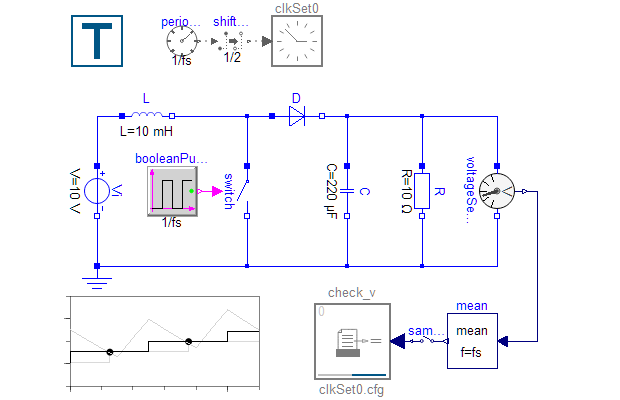
The screenshot shows how to check the output of a switched boost converter against a recording. Due to the voltage ripple, we use a mean filter to average the measured voltage and check the filtered signal once in the middle of every period.
The new clocked blocks include check blocks, recorders and clocked tables for boolean, real and integer from scalar up to 3 dimensions. Tick based tolerances are also available, to compare signals which might be shifted by one tick or more.
To get started with clocked tests, load the library in Dymola and check out
the new examples in Testing.Examples or read the guide at Testing.Clocked.UsersGuide.
This article is provided by Marco Keßler (Dassault Systèmes Austria GmbH)
Upcoming - Free Aircraft Library
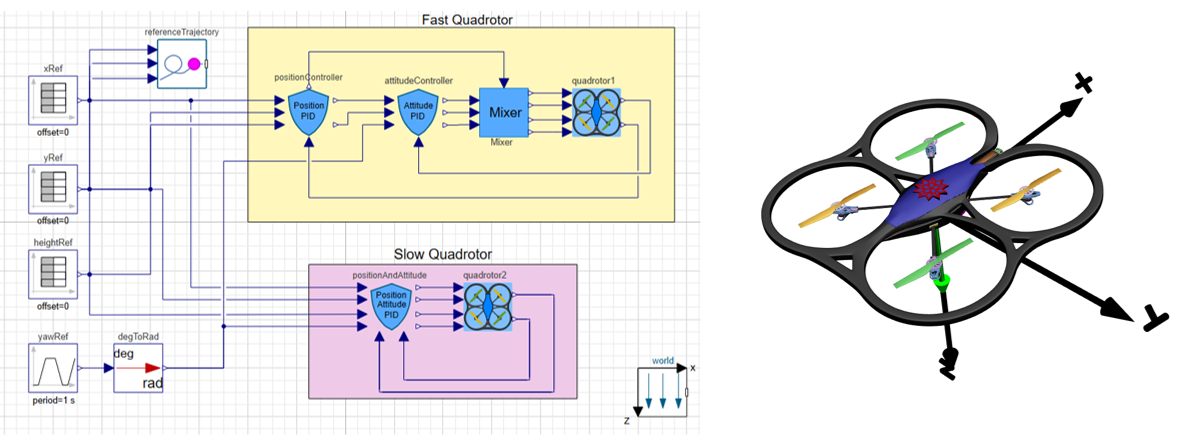
A new version of the Aircraft library will soon be released. This version adds the possibility to model drones and includes models of quadrotors. Furthermore, the library has been restructured for easier on-boarding, and providing further insights for mid & late stages of fixed-wing aircraft conceptual design.
Click here to go the System Modeler Modelica library store.
This article is provided by Ankit Naik Wolfram
Education news
eFMI® Tutorial from Modelica Conference available
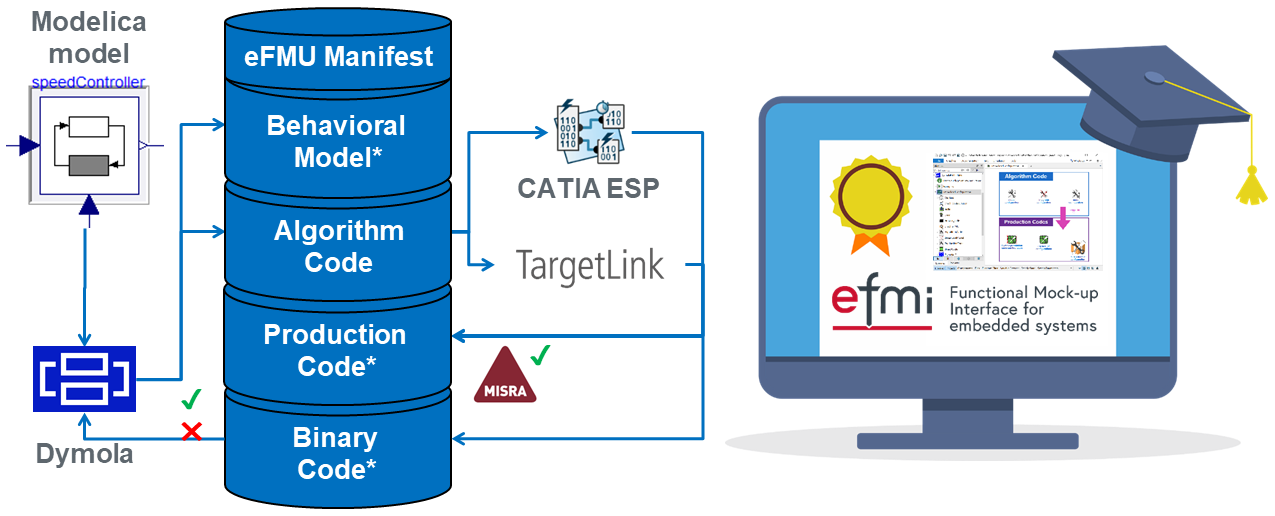
The recording and slides of the eFMI® Tutorial presented at the 15th International Modelica Conference (9th of October 2023) are now public available on YouTube (videos) and the eFMI website (slides & videos).
We had about 50 participants from 20 organizations and the feedback has been great! Close to all participants managed to follow the hands-on, for which we provided a portable Dymola & CATIA ESP with all required tooling like compilers, libraries etc included. Many of the participants got really excited and used the unique opportunity provided by the conference to discuss the feasability of eFMI in their application domain. We like to thank each participant for joining the tutorial and your kind feedback!
The complete tutorial is split into several independent parts:
- Part 1: eFMI® motivation and overview
- Part 2: Running use-case introduction
- Part 3: Hands-on demonstration in Dymola and CATIA ESP
- Part 4: Live demonstration in TargetLink
- Part 5: Short presentation of further tooling
It covers the current state-of-the-art of available eFMI tooling, including a high-level introduction to the eFMI Standard (Part 1), and a hands-on experience of eFMI technology for selected Modelica example models (Parts 2 & 3). It shows how to configure a tooling workflow from acausal physics models in Modelica down to embedded target code (Parts 3 & 4) and investigates the generated eFMUs and their various intermediate model representations. The focus is on the non-functional quality criteria satisfied by the generated solutions, like traceability within eFMUs, MISRA C:2012 conformance of generated production code and other code quality criteria like static memory allocation and error handling.
If you have any general questions or feedback on what you think we need to improve or also cover in such tutorial, please contact us on our public mailing list, efmi-info@googlegroups.com (no Google account required) or write a private mail to Christoff.Buerger@3ds.com.
Your feedback is very welcome!
This article is provided by Christoff Bürger (Dassault Systèmes)
Claytex technical blog

Claytex publishes a technical blog covering all things Modelica and Dymola.
Removing events from models to improve real-time performance
When running a model as part of Hardware in the Loop (HIL) testing, it is important that the model simulates fast enough so that overruns do not occur. Unfortunately, when events occur this can cause a model to run significantly slower for that simulation time. A workaround is to remove events from the model. This post looks at different ways this can be done.

Read the complete article here
Resolving between Multibody Frames
The vehicle models in our VeSyMA suite of libraries are multibody models, so when using them it is helpful to understand some of the basics of working with 3-dimensional mechanical systems. In a previous blog post we explained about multibody orientations, so in this post we look at how variables in the mechanical systems can be resolved in different multibody frames.

Read the complete article here
Claytex Sponsor The 15th International Modelica Conference – 9th to 11th October 2023
We exhibit and present at the 15th International Modelica Conference, organized by the Institute for Energy Efficient Buildings and Indoor Climate, RWTH Aachen University, in collaboration with the Modelica Association.
Paper title: Race Car Cooling System Model for Real Time use in a Driving Simulator
Abstract: Powertrain performance optimization is one of main targets in racecar and road hypercar development. A key activity needed for both endothermal and electric powertrains is the cooling system sizing through simulation to make sure that the temperature limits are not exceeded in the most aggressive conditions minimizing or avoiding power derating. This article describes the implementation of a 1D cooling system simulation model integrated with a vehicle multibody model to be used in real time in the Dallara dynamic driving simulator with human driver. This activity is the result of a collaboration between Dallara which uses the model implemented to develop and optimize the cooling system architecture of its vehicles, and Claytex who develop the libraries used to generate these simulation models. The model has been validated through comparison with real data of an existing vehicle yielding a RMSE of 0.99 °C.

Learn more about our paper here
This article is provided by Mahdieh Mehrabi (Claytex)